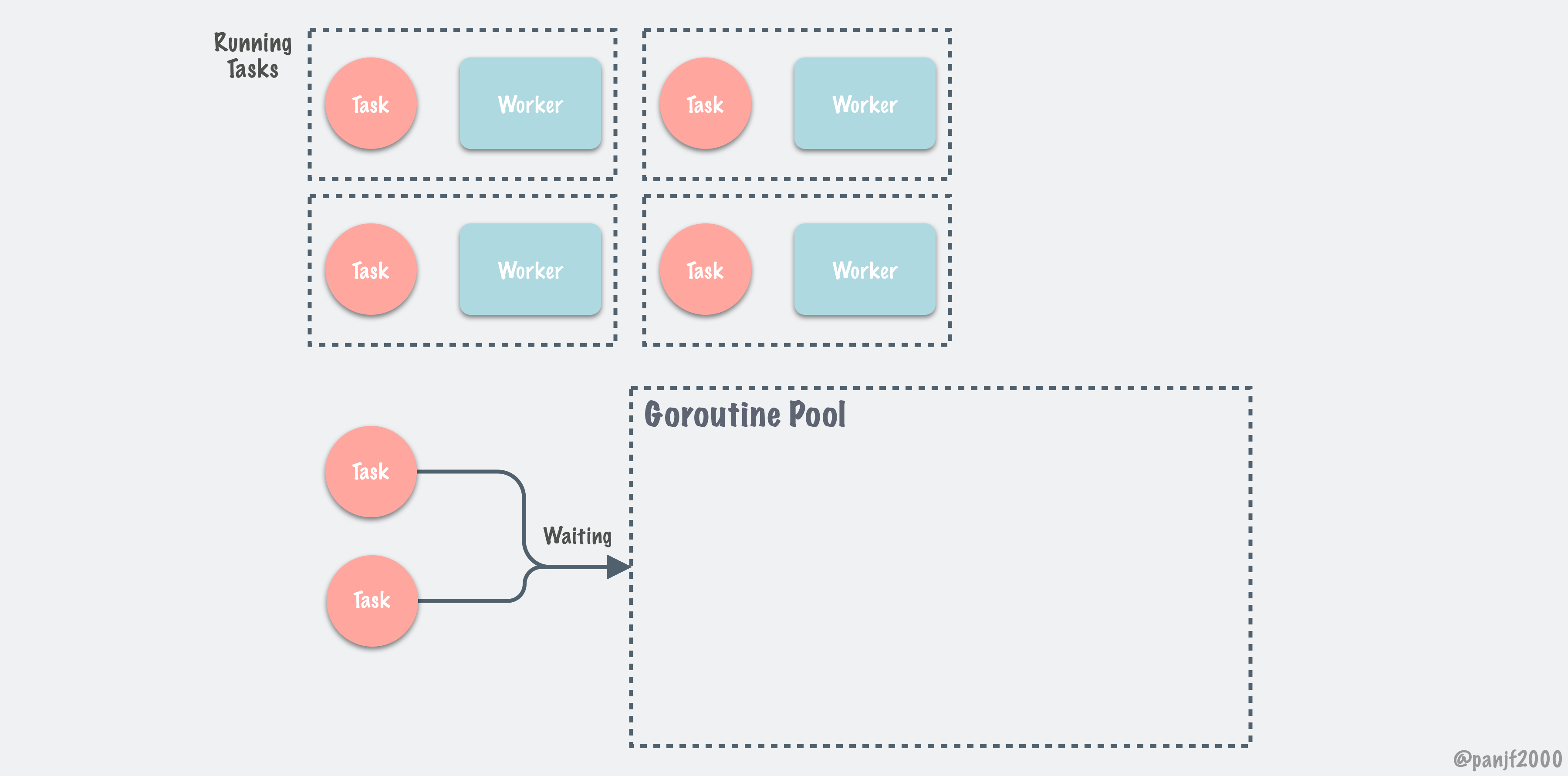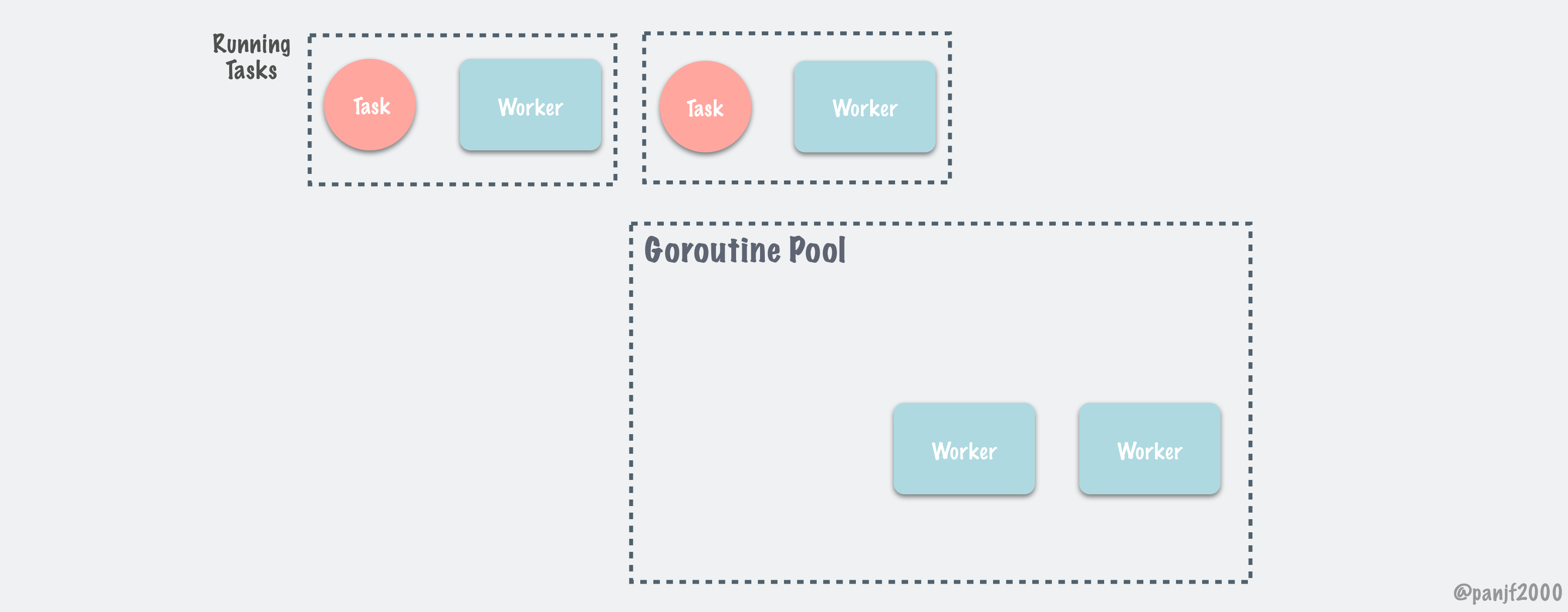 Documentation
¶
Documentation
¶
Overview ¶
Package ants implements an efficient and reliable goroutine pool for Go.
With ants, Go applications are able to limit the number of active goroutines, recycle goroutines efficiently, and reduce the memory footprint significantly. Package ants is extremely useful in the scenarios where a massive number of goroutines are created and destroyed frequently, such as highly-concurrent batch processing systems, HTTP servers, services of asynchronous tasks, etc.
Index ¶
- Constants
- Variables
- func Cap() int
- func Free() int
- func Reboot()
- func Release()
- func ReleaseTimeout(timeout time.Duration) error
- func Running() int
- func Submit(task func()) error
- type LoadBalancingStrategy
- type Logger
- type MultiPool
- func (mp *MultiPool) Cap() (n int)
- func (mp *MultiPool) Free() (n int)
- func (mp *MultiPool) FreeByIndex(idx int) (int, error)
- func (mp *MultiPool) IsClosed() bool
- func (mp *MultiPool) Reboot()
- func (mp *MultiPool) ReleaseTimeout(timeout time.Duration) error
- func (mp *MultiPool) Running() (n int)
- func (mp *MultiPool) RunningByIndex(idx int) (int, error)
- func (mp *MultiPool) Submit(task func()) (err error)
- func (mp *MultiPool) Tune(size int)
- func (mp *MultiPool) Waiting() (n int)
- func (mp *MultiPool) WaitingByIndex(idx int) (int, error)
- type MultiPoolWithFunc
- func (mp *MultiPoolWithFunc) Cap() (n int)
- func (mp *MultiPoolWithFunc) Free() (n int)
- func (mp *MultiPoolWithFunc) FreeByIndex(idx int) (int, error)
- func (mp *MultiPoolWithFunc) Invoke(args any) (err error)
- func (mp *MultiPoolWithFunc) IsClosed() bool
- func (mp *MultiPoolWithFunc) Reboot()
- func (mp *MultiPoolWithFunc) ReleaseTimeout(timeout time.Duration) error
- func (mp *MultiPoolWithFunc) Running() (n int)
- func (mp *MultiPoolWithFunc) RunningByIndex(idx int) (int, error)
- func (mp *MultiPoolWithFunc) Tune(size int)
- func (mp *MultiPoolWithFunc) Waiting() (n int)
- func (mp *MultiPoolWithFunc) WaitingByIndex(idx int) (int, error)
- type MultiPoolWithFuncGeneric
- func (mp *MultiPoolWithFuncGeneric[T]) Cap() (n int)
- func (mp *MultiPoolWithFuncGeneric[T]) Free() (n int)
- func (mp *MultiPoolWithFuncGeneric[T]) FreeByIndex(idx int) (int, error)
- func (mp *MultiPoolWithFuncGeneric[T]) Invoke(args T) (err error)
- func (mp *MultiPoolWithFuncGeneric[T]) IsClosed() bool
- func (mp *MultiPoolWithFuncGeneric[T]) Reboot()
- func (mp *MultiPoolWithFuncGeneric[T]) ReleaseTimeout(timeout time.Duration) error
- func (mp *MultiPoolWithFuncGeneric[T]) Running() (n int)
- func (mp *MultiPoolWithFuncGeneric[T]) RunningByIndex(idx int) (int, error)
- func (mp *MultiPoolWithFuncGeneric[T]) Tune(size int)
- func (mp *MultiPoolWithFuncGeneric[T]) Waiting() (n int)
- func (mp *MultiPoolWithFuncGeneric[T]) WaitingByIndex(idx int) (int, error)
- type Option
- func WithDisablePurge(disable bool) Option
- func WithExpiryDuration(expiryDuration time.Duration) Option
- func WithLogger(logger Logger) Option
- func WithMaxBlockingTasks(maxBlockingTasks int) Option
- func WithNonblocking(nonblocking bool) Option
- func WithOptions(options Options) Option
- func WithPanicHandler(panicHandler func(any)) Option
- func WithPreAlloc(preAlloc bool) Option
- type Options
- type Pool
- func (p Pool) Cap() int
- func (p Pool) Free() int
- func (p Pool) IsClosed() bool
- func (p Pool) Reboot()
- func (p Pool) Release()
- func (p Pool) ReleaseTimeout(timeout time.Duration) error
- func (p Pool) Running() int
- func (p *Pool) Submit(task func()) error
- func (p Pool) Tune(size int)
- func (p Pool) Waiting() int
- type PoolWithFunc
- func (p PoolWithFunc) Cap() int
- func (p PoolWithFunc) Free() int
- func (p *PoolWithFunc) Invoke(arg any) error
- func (p PoolWithFunc) IsClosed() bool
- func (p PoolWithFunc) Reboot()
- func (p PoolWithFunc) Release()
- func (p PoolWithFunc) ReleaseTimeout(timeout time.Duration) error
- func (p PoolWithFunc) Running() int
- func (p PoolWithFunc) Tune(size int)
- func (p PoolWithFunc) Waiting() int
- type PoolWithFuncGeneric
- func (p PoolWithFuncGeneric) Cap() int
- func (p PoolWithFuncGeneric) Free() int
- func (p *PoolWithFuncGeneric[T]) Invoke(arg T) error
- func (p PoolWithFuncGeneric) IsClosed() bool
- func (p PoolWithFuncGeneric) Reboot()
- func (p PoolWithFuncGeneric) Release()
- func (p PoolWithFuncGeneric) ReleaseTimeout(timeout time.Duration) error
- func (p PoolWithFuncGeneric) Running() int
- func (p PoolWithFuncGeneric) Tune(size int)
- func (p PoolWithFuncGeneric) Waiting() int
Examples ¶
Constants ¶
const ( // DefaultAntsPoolSize is the default capacity for a default goroutine pool. DefaultAntsPoolSize = math.MaxInt32 // DefaultCleanIntervalTime is the interval time to clean up goroutines. DefaultCleanIntervalTime = time.Second )
const ( // OPENED represents that the pool is opened. OPENED = iota // CLOSED represents that the pool is closed. CLOSED )
Variables ¶
var ( // ErrLackPoolFunc will be returned when invokers don't provide function for pool. ErrLackPoolFunc = errors.New("must provide function for pool") // ErrInvalidPoolExpiry will be returned when setting a negative number as the periodic duration to purge goroutines. ErrInvalidPoolExpiry = errors.New("invalid expiry for pool") // ErrPoolClosed will be returned when submitting task to a closed pool. ErrPoolClosed = errors.New("this pool has been closed") // ErrPoolOverload will be returned when the pool is full and no workers available. ErrPoolOverload = errors.New("too many goroutines blocked on submit or Nonblocking is set") // ErrInvalidPreAllocSize will be returned when trying to set up a negative capacity under PreAlloc mode. ErrInvalidPreAllocSize = errors.New("can not set up a negative capacity under PreAlloc mode") // ErrTimeout will be returned after the operations timed out. ErrTimeout = errors.New("operation timed out") // ErrInvalidPoolIndex will be returned when trying to retrieve a pool with an invalid index. ErrInvalidPoolIndex = errors.New("invalid pool index") // ErrInvalidLoadBalancingStrategy will be returned when trying to create a MultiPool with an invalid load-balancing strategy. ErrInvalidLoadBalancingStrategy = errors.New("invalid load-balancing strategy") // ErrInvalidMultiPoolSize will be returned when trying to create a MultiPool with an invalid size. ErrInvalidMultiPoolSize = errors.New("invalid size for multiple pool") )
Functions ¶
func ReleaseTimeout ¶ added in v2.8.0
ReleaseTimeout is like Release but with a timeout, it waits all workers to exit before timing out.
Types ¶
type LoadBalancingStrategy ¶ added in v2.9.0
type LoadBalancingStrategy int
LoadBalancingStrategy represents the type of load-balancing algorithm.
const ( // RoundRobin distributes task to a list of pools in rotation. RoundRobin LoadBalancingStrategy = 1 << (iota + 1) // LeastTasks always selects the pool with the least number of pending tasks. LeastTasks )
type Logger ¶ added in v2.4.0
type Logger interface {
// Printf must have the same semantics as log.Printf.
Printf(format string, args ...any)
}
Logger is used for logging formatted messages.
type MultiPool ¶ added in v2.9.0
type MultiPool struct {
// contains filtered or unexported fields
}
MultiPool consists of multiple pools, from which you will benefit the performance improvement on basis of the fine-grained locking that reduces the lock contention. MultiPool is a good fit for the scenario where you have a large number of tasks to submit, and you don't want the single pool to be the bottleneck.
Example ¶
atomic.StoreInt32(&sum, 0)
runTimes := 1000
wg.Add(runTimes)
mp, _ := ants.NewMultiPool(10, runTimes/10, ants.RoundRobin)
defer mp.ReleaseTimeout(time.Second) // nolint:errcheck
for i := 0; i < runTimes; i++ {
j := i
_ = mp.Submit(func() {
incSumInt(int32(j))
})
}
wg.Wait()
fmt.Printf("The result is %d\n", sum)
Output: The result is 499500
func NewMultiPool ¶ added in v2.9.0
func NewMultiPool(size, sizePerPool int, lbs LoadBalancingStrategy, options ...Option) (*MultiPool, error)
NewMultiPool instantiates a MultiPool with a size of the pool list and a size per pool, and the load-balancing strategy.
func (*MultiPool) Free ¶ added in v2.9.0
Free returns the number of available workers across all pools.
func (*MultiPool) FreeByIndex ¶ added in v2.9.0
FreeByIndex returns the number of available workers in the specific pool.
func (*MultiPool) Reboot ¶ added in v2.9.0
func (mp *MultiPool) Reboot()
Reboot reboots a released multi-pool.
func (*MultiPool) ReleaseTimeout ¶ added in v2.9.0
ReleaseTimeout closes the multi-pool with a timeout, it waits all pools to be closed before timing out.
func (*MultiPool) Running ¶ added in v2.9.0
Running returns the number of the currently running workers across all pools.
func (*MultiPool) RunningByIndex ¶ added in v2.9.0
RunningByIndex returns the number of the currently running workers in the specific pool.
func (*MultiPool) Submit ¶ added in v2.9.0
Submit submits a task to a pool selected by the load-balancing strategy.
func (*MultiPool) Tune ¶ added in v2.9.0
Tune resizes each pool in multi-pool.
Note that this method doesn't resize the overall capacity of multi-pool.
type MultiPoolWithFunc ¶ added in v2.9.0
type MultiPoolWithFunc struct {
// contains filtered or unexported fields
}
MultiPoolWithFunc consists of multiple pools, from which you will benefit the performance improvement on basis of the fine-grained locking that reduces the lock contention. MultiPoolWithFunc is a good fit for the scenario where you have a large number of tasks to submit, and you don't want the single pool to be the bottleneck.
Example ¶
atomic.StoreInt32(&sum, 0)
runTimes := 1000
wg.Add(runTimes)
mp, _ := ants.NewMultiPoolWithFunc(10, runTimes/10, incSum, ants.RoundRobin)
defer mp.ReleaseTimeout(time.Second) // nolint:errcheck
for i := 0; i < runTimes; i++ {
_ = mp.Invoke(int32(i))
}
wg.Wait()
fmt.Printf("The result is %d\n", sum)
Output: The result is 499500
func NewMultiPoolWithFunc ¶ added in v2.9.0
func NewMultiPoolWithFunc(size, sizePerPool int, fn func(any), lbs LoadBalancingStrategy, options ...Option) (*MultiPoolWithFunc, error)
NewMultiPoolWithFunc instantiates a MultiPoolWithFunc with a size of the pool list and a size per pool, and the load-balancing strategy.
func (*MultiPoolWithFunc) Cap ¶ added in v2.9.0
func (mp *MultiPoolWithFunc) Cap() (n int)
Cap returns the capacity of this multi-pool.
func (*MultiPoolWithFunc) Free ¶ added in v2.9.0
func (mp *MultiPoolWithFunc) Free() (n int)
Free returns the number of available workers across all pools.
func (*MultiPoolWithFunc) FreeByIndex ¶ added in v2.9.0
func (mp *MultiPoolWithFunc) FreeByIndex(idx int) (int, error)
FreeByIndex returns the number of available workers in the specific pool.
func (*MultiPoolWithFunc) Invoke ¶ added in v2.9.0
func (mp *MultiPoolWithFunc) Invoke(args any) (err error)
Invoke submits a task to a pool selected by the load-balancing strategy.
func (*MultiPoolWithFunc) IsClosed ¶ added in v2.9.0
func (mp *MultiPoolWithFunc) IsClosed() bool
IsClosed indicates whether the multi-pool is closed.
func (*MultiPoolWithFunc) Reboot ¶ added in v2.9.0
func (mp *MultiPoolWithFunc) Reboot()
Reboot reboots a released multi-pool.
func (*MultiPoolWithFunc) ReleaseTimeout ¶ added in v2.9.0
func (mp *MultiPoolWithFunc) ReleaseTimeout(timeout time.Duration) error
ReleaseTimeout closes the multi-pool with a timeout, it waits all pools to be closed before timing out.
func (*MultiPoolWithFunc) Running ¶ added in v2.9.0
func (mp *MultiPoolWithFunc) Running() (n int)
Running returns the number of the currently running workers across all pools.
func (*MultiPoolWithFunc) RunningByIndex ¶ added in v2.9.0
func (mp *MultiPoolWithFunc) RunningByIndex(idx int) (int, error)
RunningByIndex returns the number of the currently running workers in the specific pool.
func (*MultiPoolWithFunc) Tune ¶ added in v2.9.0
func (mp *MultiPoolWithFunc) Tune(size int)
Tune resizes each pool in multi-pool.
Note that this method doesn't resize the overall capacity of multi-pool.
func (*MultiPoolWithFunc) Waiting ¶ added in v2.9.0
func (mp *MultiPoolWithFunc) Waiting() (n int)
Waiting returns the number of the currently waiting tasks across all pools.
func (*MultiPoolWithFunc) WaitingByIndex ¶ added in v2.9.0
func (mp *MultiPoolWithFunc) WaitingByIndex(idx int) (int, error)
WaitingByIndex returns the number of the currently waiting tasks in the specific pool.
type MultiPoolWithFuncGeneric ¶ added in v2.11.0
type MultiPoolWithFuncGeneric[T any] struct { // contains filtered or unexported fields }
MultiPoolWithFuncGeneric is the generic version of MultiPoolWithFunc.
Example ¶
atomic.StoreInt32(&sum, 0)
runTimes := 1000
wg.Add(runTimes)
mp, _ := ants.NewMultiPoolWithFuncGeneric(10, runTimes/10, incSumInt, ants.RoundRobin)
defer mp.ReleaseTimeout(time.Second) // nolint:errcheck
for i := 0; i < runTimes; i++ {
_ = mp.Invoke(int32(i))
}
wg.Wait()
fmt.Printf("The result is %d\n", sum)
Output: The result is 499500
func NewMultiPoolWithFuncGeneric ¶ added in v2.11.0
func NewMultiPoolWithFuncGeneric[T any](size, sizePerPool int, fn func(T), lbs LoadBalancingStrategy, options ...Option) (*MultiPoolWithFuncGeneric[T], error)
NewMultiPoolWithFuncGeneric instantiates a MultiPoolWithFunc with a size of the pool list and a size per pool, and the load-balancing strategy.
func (*MultiPoolWithFuncGeneric[T]) Cap ¶ added in v2.11.0
func (mp *MultiPoolWithFuncGeneric[T]) Cap() (n int)
Cap returns the capacity of this multi-pool.
func (*MultiPoolWithFuncGeneric[T]) Free ¶ added in v2.11.0
func (mp *MultiPoolWithFuncGeneric[T]) Free() (n int)
Free returns the number of available workers across all pools.
func (*MultiPoolWithFuncGeneric[T]) FreeByIndex ¶ added in v2.11.0
func (mp *MultiPoolWithFuncGeneric[T]) FreeByIndex(idx int) (int, error)
FreeByIndex returns the number of available workers in the specific pool.
func (*MultiPoolWithFuncGeneric[T]) Invoke ¶ added in v2.11.0
func (mp *MultiPoolWithFuncGeneric[T]) Invoke(args T) (err error)
Invoke submits a task to a pool selected by the load-balancing strategy.
func (*MultiPoolWithFuncGeneric[T]) IsClosed ¶ added in v2.11.0
func (mp *MultiPoolWithFuncGeneric[T]) IsClosed() bool
IsClosed indicates whether the multi-pool is closed.
func (*MultiPoolWithFuncGeneric[T]) Reboot ¶ added in v2.11.0
func (mp *MultiPoolWithFuncGeneric[T]) Reboot()
Reboot reboots a released multi-pool.
func (*MultiPoolWithFuncGeneric[T]) ReleaseTimeout ¶ added in v2.11.0
func (mp *MultiPoolWithFuncGeneric[T]) ReleaseTimeout(timeout time.Duration) error
ReleaseTimeout closes the multi-pool with a timeout, it waits all pools to be closed before timing out.
func (*MultiPoolWithFuncGeneric[T]) Running ¶ added in v2.11.0
func (mp *MultiPoolWithFuncGeneric[T]) Running() (n int)
Running returns the number of the currently running workers across all pools.
func (*MultiPoolWithFuncGeneric[T]) RunningByIndex ¶ added in v2.11.0
func (mp *MultiPoolWithFuncGeneric[T]) RunningByIndex(idx int) (int, error)
RunningByIndex returns the number of the currently running workers in the specific pool.
func (*MultiPoolWithFuncGeneric[T]) Tune ¶ added in v2.11.0
func (mp *MultiPoolWithFuncGeneric[T]) Tune(size int)
Tune resizes each pool in multi-pool.
Note that this method doesn't resize the overall capacity of multi-pool.
func (*MultiPoolWithFuncGeneric[T]) Waiting ¶ added in v2.11.0
func (mp *MultiPoolWithFuncGeneric[T]) Waiting() (n int)
Waiting returns the number of the currently waiting tasks across all pools.
func (*MultiPoolWithFuncGeneric[T]) WaitingByIndex ¶ added in v2.11.0
func (mp *MultiPoolWithFuncGeneric[T]) WaitingByIndex(idx int) (int, error)
WaitingByIndex returns the number of the currently waiting tasks in the specific pool.
type Option ¶
type Option func(opts *Options)
Option represents the optional function.
func WithDisablePurge ¶ added in v2.6.0
WithDisablePurge indicates whether we turn off automatically purge.
func WithExpiryDuration ¶
WithExpiryDuration sets up the interval time of cleaning up goroutines.
func WithLogger ¶ added in v2.4.0
WithLogger sets up a customized logger.
func WithMaxBlockingTasks ¶
WithMaxBlockingTasks sets up the maximum number of goroutines that are blocked when it reaches the capacity of pool.
func WithNonblocking ¶
WithNonblocking indicates that pool will return nil when there is no available workers.
func WithOptions ¶
WithOptions accepts the whole Options config.
func WithPanicHandler ¶
WithPanicHandler sets up panic handler.
func WithPreAlloc ¶
WithPreAlloc indicates whether it should malloc for workers.
type Options ¶
type Options struct {
// ExpiryDuration is a period for the scavenger goroutine to clean up those expired workers,
// the scavenger scans all workers every `ExpiryDuration` and clean up those workers that haven't been
// used for more than `ExpiryDuration`.
ExpiryDuration time.Duration
// PreAlloc indicates whether to make memory pre-allocation when initializing Pool.
PreAlloc bool
// Max number of goroutine blocking on pool.Submit.
// 0 (default value) means no such limit.
MaxBlockingTasks int
// When Nonblocking is true, Pool.Submit will never be blocked.
// ErrPoolOverload will be returned when Pool.Submit cannot be done at once.
// When Nonblocking is true, MaxBlockingTasks is inoperative.
Nonblocking bool
// PanicHandler is used to handle panics from each worker goroutine.
// If nil, the default behavior is to capture the value given to panic
// and resume normal execution and print that value along with the
// stack trace of the goroutine
PanicHandler func(any)
// Logger is the customized logger for logging info, if it is not set,
// default standard logger from log package is used.
Logger Logger
// When DisablePurge is true, workers are not purged and are resident.
DisablePurge bool
}
Options contains all options which will be applied when instantiating an ants pool.
type Pool ¶
type Pool struct {
// contains filtered or unexported fields
}
Pool is a goroutine pool that limits and recycles a mass of goroutines. The pool capacity can be fixed or unlimited.
Example ¶
ants.Reboot() // ensure the default pool is available
atomic.StoreInt32(&sum, 0)
runTimes := 1000
wg.Add(runTimes)
// Use the default pool.
for i := 0; i < runTimes; i++ {
j := i
_ = ants.Submit(func() {
incSumInt(int32(j))
})
}
wg.Wait()
fmt.Printf("The result is %d\n", sum)
atomic.StoreInt32(&sum, 0)
wg.Add(runTimes)
// Use the new pool.
pool, _ := ants.NewPool(10)
defer pool.Release()
for i := 0; i < runTimes; i++ {
j := i
_ = pool.Submit(func() {
incSumInt(int32(j))
})
}
wg.Wait()
fmt.Printf("The result is %d\n", sum)
Output: The result is 499500 The result is 499500
func (Pool) Free ¶
func (p Pool) Free() int
Free returns the number of available workers, -1 indicates this pool is unlimited.
func (Pool) IsClosed ¶ added in v2.4.4
func (p Pool) IsClosed() bool
IsClosed indicates whether the pool is closed.
func (Pool) Reboot ¶ added in v2.3.0
func (p Pool) Reboot()
Reboot reboots a closed pool, it does nothing if the pool is not closed. If you intend to reboot a closed pool, use ReleaseTimeout() instead of Release() to ensure that all workers are stopped and resource are released before rebooting, otherwise you may run into data race.
func (Pool) Release ¶
func (p Pool) Release()
Release closes this pool and releases the worker queue.
func (Pool) ReleaseTimeout ¶ added in v2.5.0
ReleaseTimeout is like Release but with a timeout, it waits all workers to exit before timing out.
func (Pool) Running ¶
func (p Pool) Running() int
Running returns the number of workers currently running.
func (*Pool) Submit ¶
Submit submits a task to the pool.
Note that you are allowed to call Pool.Submit() from the current Pool.Submit(), but what calls for special attention is that you will get blocked with the last Pool.Submit() call once the current Pool runs out of its capacity, and to avoid this, you should instantiate a Pool with ants.WithNonblocking(true).
type PoolWithFunc ¶
type PoolWithFunc struct {
// contains filtered or unexported fields
}
PoolWithFunc is like Pool but accepts a unified function for all goroutines to execute.
Example ¶
atomic.StoreInt32(&sum, 0)
runTimes := 1000
wg.Add(runTimes)
pool, _ := ants.NewPoolWithFunc(10, incSum)
defer pool.Release()
for i := 0; i < runTimes; i++ {
_ = pool.Invoke(int32(i))
}
wg.Wait()
fmt.Printf("The result is %d\n", sum)
Output: The result is 499500
func NewPoolWithFunc ¶
func NewPoolWithFunc(size int, pf func(any), options ...Option) (*PoolWithFunc, error)
NewPoolWithFunc instantiates a PoolWithFunc with customized options.
func (PoolWithFunc) Free ¶
func (p PoolWithFunc) Free() int
Free returns the number of available workers, -1 indicates this pool is unlimited.
func (*PoolWithFunc) Invoke ¶
func (p *PoolWithFunc) Invoke(arg any) error
Invoke passes arguments to the pool.
Note that you are allowed to call Pool.Invoke() from the current Pool.Invoke(), but what calls for special attention is that you will get blocked with the last Pool.Invoke() call once the current Pool runs out of its capacity, and to avoid this, you should instantiate a PoolWithFunc with ants.WithNonblocking(true).
func (PoolWithFunc) IsClosed ¶ added in v2.4.4
func (p PoolWithFunc) IsClosed() bool
IsClosed indicates whether the pool is closed.
func (PoolWithFunc) Reboot ¶ added in v2.3.0
func (p PoolWithFunc) Reboot()
Reboot reboots a closed pool, it does nothing if the pool is not closed. If you intend to reboot a closed pool, use ReleaseTimeout() instead of Release() to ensure that all workers are stopped and resource are released before rebooting, otherwise you may run into data race.
func (PoolWithFunc) Release ¶
func (p PoolWithFunc) Release()
Release closes this pool and releases the worker queue.
func (PoolWithFunc) ReleaseTimeout ¶ added in v2.5.0
ReleaseTimeout is like Release but with a timeout, it waits all workers to exit before timing out.
func (PoolWithFunc) Running ¶
func (p PoolWithFunc) Running() int
Running returns the number of workers currently running.
type PoolWithFuncGeneric ¶ added in v2.11.0
type PoolWithFuncGeneric[T any] struct { // contains filtered or unexported fields }
PoolWithFuncGeneric is the generic version of PoolWithFunc.
Example ¶
atomic.StoreInt32(&sum, 0)
runTimes := 1000
wg.Add(runTimes)
pool, _ := ants.NewPoolWithFuncGeneric(10, incSumInt)
defer pool.Release()
for i := 0; i < runTimes; i++ {
_ = pool.Invoke(int32(i))
}
wg.Wait()
fmt.Printf("The result is %d\n", sum)
Output: The result is 499500
func NewPoolWithFuncGeneric ¶ added in v2.11.0
func NewPoolWithFuncGeneric[T any](size int, pf func(T), options ...Option) (*PoolWithFuncGeneric[T], error)
NewPoolWithFuncGeneric instantiates a PoolWithFuncGeneric[T] with customized options.
func (PoolWithFuncGeneric) Cap ¶ added in v2.11.0
func (p PoolWithFuncGeneric) Cap() int
Cap returns the capacity of this pool.
func (PoolWithFuncGeneric) Free ¶ added in v2.11.0
func (p PoolWithFuncGeneric) Free() int
Free returns the number of available workers, -1 indicates this pool is unlimited.
func (*PoolWithFuncGeneric[T]) Invoke ¶ added in v2.11.0
func (p *PoolWithFuncGeneric[T]) Invoke(arg T) error
Invoke passes the argument to the pool to start a new task.
func (PoolWithFuncGeneric) IsClosed ¶ added in v2.11.0
func (p PoolWithFuncGeneric) IsClosed() bool
IsClosed indicates whether the pool is closed.
func (PoolWithFuncGeneric) Reboot ¶ added in v2.11.0
func (p PoolWithFuncGeneric) Reboot()
Reboot reboots a closed pool, it does nothing if the pool is not closed. If you intend to reboot a closed pool, use ReleaseTimeout() instead of Release() to ensure that all workers are stopped and resource are released before rebooting, otherwise you may run into data race.
func (PoolWithFuncGeneric) Release ¶ added in v2.11.0
func (p PoolWithFuncGeneric) Release()
Release closes this pool and releases the worker queue.
func (PoolWithFuncGeneric) ReleaseTimeout ¶ added in v2.11.0
ReleaseTimeout is like Release but with a timeout, it waits all workers to exit before timing out.
func (PoolWithFuncGeneric) Running ¶ added in v2.11.0
func (p PoolWithFuncGeneric) Running() int
Running returns the number of workers currently running.
 A goroutine pool for Go
A goroutine pool for Go






























